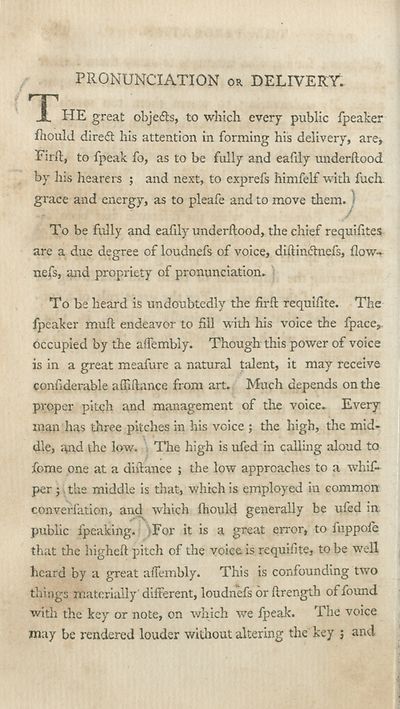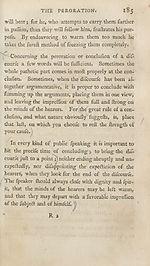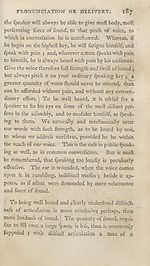Download files
Complete book:
Individual page:
Thumbnail gallery: Grid view | List view

PRONUNCIATION or DELIVERY.
r JL ' HE great objedls, to which every public fpeaker
fhould dire<5t his attention in forming his delivery, are,
Firft, to fpeak fo, as to be fully and eafily underftood
by his hearers ; and next, to exprefs himfelf with fuch-
grace and energy, as to pleafe and to move them, j
To be fully and eafily underllood, the chief requifltes
are a due degree of loudnefs of voice, diftinftncfs, flow*
nefs, and propriety of pronunciation.
To be heard is undoubtedly the firft requifite. The
fpeaker muft endeavor to fill with his voice the fpace,
occupied by the affembly. Though this power of voice
is in a great meafure a natural talent, it may receive
confiderable afiiftance from art. Much depends on the
proper pitch and management of the voice. Every¬
man has three pitches in his voice ; the high, the mid¬
dle, and the low. . The high is ufed in calling aloud to
fome one at a diftance ; the low approaches to a whif*
per ;. the middle is that, which is employed in common
converfation, and which fhould generally be ufed in.
public fpeaking. ‘For it is a great error, to fuppofe
that the higheft pitch of the voice is requifite, to be well
heard by a great affembly. This is confounding two
things materially' different, loudnefs or ftrength of found
with the key or note, on which we fpeak. The voice
may be rendered louder without altering the key ; and
r JL ' HE great objedls, to which every public fpeaker
fhould dire<5t his attention in forming his delivery, are,
Firft, to fpeak fo, as to be fully and eafily underftood
by his hearers ; and next, to exprefs himfelf with fuch-
grace and energy, as to pleafe and to move them, j
To be fully and eafily underllood, the chief requifltes
are a due degree of loudnefs of voice, diftinftncfs, flow*
nefs, and propriety of pronunciation.
To be heard is undoubtedly the firft requifite. The
fpeaker muft endeavor to fill with his voice the fpace,
occupied by the affembly. Though this power of voice
is in a great meafure a natural talent, it may receive
confiderable afiiftance from art. Much depends on the
proper pitch and management of the voice. Every¬
man has three pitches in his voice ; the high, the mid¬
dle, and the low. . The high is ufed in calling aloud to
fome one at a diftance ; the low approaches to a whif*
per ;. the middle is that, which is employed in common
converfation, and which fhould generally be ufed in.
public fpeaking. ‘For it is a great error, to fuppofe
that the higheft pitch of the voice is requifite, to be well
heard by a great affembly. This is confounding two
things materially' different, loudnefs or ftrength of found
with the key or note, on which we fpeak. The voice
may be rendered louder without altering the key ; and
Set display mode to:
![]() Universal Viewer |
Universal Viewer | ![]() Mirador |
Large image | Transcription
Mirador |
Large image | Transcription
| Antiquarian books of Scotland > Languages & literature > Abridgement of lectures on rhetoric > (202) |
|---|
| Permanent URL | https://digital.nls.uk/135468878 |
|---|
| Description | Thousands of printed books from the Antiquarian Books of Scotland collection which dates from 1641 to the 1980s. The collection consists of 14,800 books which were published in Scotland or have a Scottish connection, e.g. through the author, printer or owner. Subjects covered include sport, education, diseases, adventure, occupations, Jacobites, politics and religion. Among the 29 languages represented are English, Gaelic, Italian, French, Russian and Swedish. |
|---|

